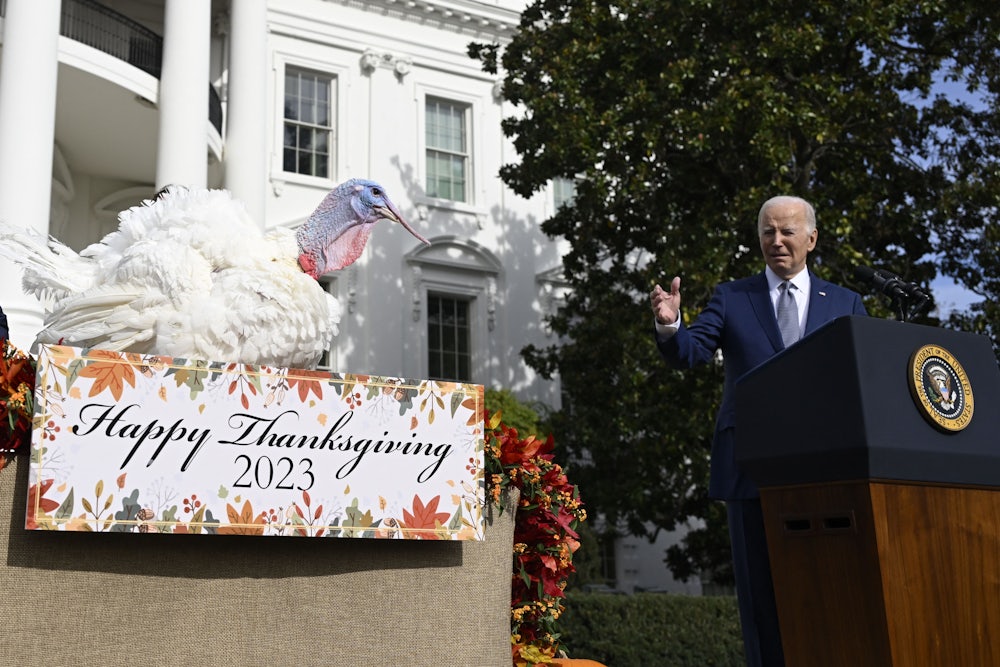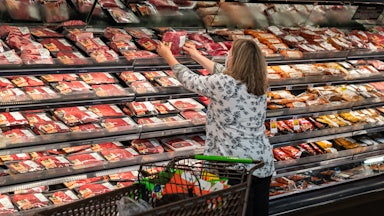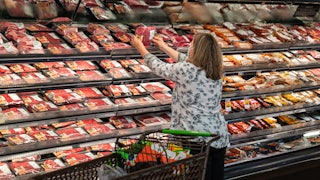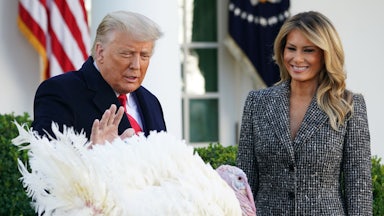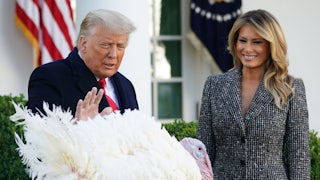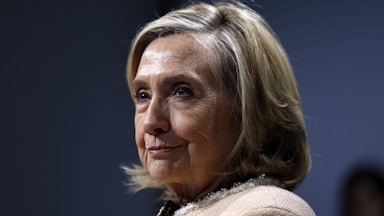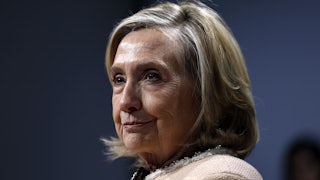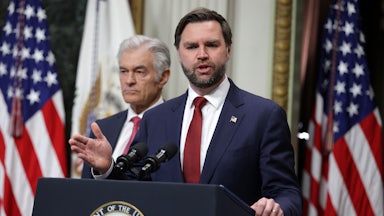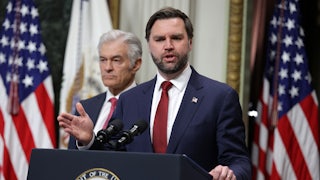On Monday afternoon, squinting into the sun on the White House lawn, Joe Biden engaged in one of the most tawdry political traditions in the United States: the Thanksgiving turkey pardon.
For over three decades, the structure has remained largely the same: First, the president makes awkward small talk and dad jokes. (In Biden’s case, he mentioned his age twice, and—unfortunately not as a joke—confused Britney Spears with Taylor Swift.) Second, the president gives free publicity to the National Turkey Federation, the industry group that provides turkeys for the event. Third, the president underlines the importance of Thanksgiving and national togetherness. Biden didn’t stray from the script.
This ritualistic mockery of both animal rights and the arbitrariness of executive power began as a way to distract from the Iran-Contra affair. When reporters asked Ronald Reagan whether he would pardon Oliver North and John Poindexter for providing weapons to paramilitary death squads in Nicaragua, he said he would pardon a turkey named Charlie. The White House had been receiving two turkeys every year from the National Turkey Federation since 1947, providing a photo op benefiting both politician and industry. And while JFK offered off-the-cuff clemency to a bird one time by saying, “Let’s just keep him,” and Reagan then used the pardoning language in 1987, it was George W. Bush who claimed to officially grant a turkey a “presidential pardon” in 1989, allegedly in an ad-libbed response to animal rights activists picketing the event.
Since then, the pardon’s three-act play has recognized an individual turkey farmer each year as a shibboleth of American agriculture and humane treatment of animals. On Monday, no reporters could ask the president either about geopolitics or, more prosaically, about the provenance of “Liberty” and “Bell,” provided for the occasion by Minnesota-based Jennie-O turkey, a subsidiary of the factory farming giant Hormel Foods. Most newspapers dutifully ran stories about the Britney-Taylor flub rather than about the whole event as an exercise in political obfuscation.
Let’s start with the water carrying for industrial agriculture—although it’s by no means the only problem with this tradition. The turkey industry will have its most lucrative day of the year on Thursday, when Americans will spend close to a billion dollars on over 45 million birds who don’t look much like Liberty or Bell. Virtually all turkeys raised in the United States come from crowded concentrated feeding operations—CAFOs, or factory farms. Investigations by animal rights groups like Direct Action Everywhere, or DxE, have shown that the same farms that provide the well-groomed, handsome birds for White House events raise the rest of their animals in hellish conditions. In 2016, DxE showed that Jaindl, the Pennsylvania farm that provided turkeys for Obama’s lame-duck period Thanksgiving event ran overcrowded farms full of sick and maimed birds. And on Tuesday, the same group released footage taken at a farm owned by this year’s provider, Jennie-O, which shows conditions much like those at Jaindl, which the group claims “are not just cruel but illegal under state law.” To the extent that Thanksgiving is a culinary tradition, it is one rooted in mass-scale cruelty to animals. And the legal system has proven more than willing to blame the messenger about this inconvenient truth. Wayne Hsiung, the founder of DxE, was recently convicted in California for organizing the sort of investigations that shine a light on the routine cruelty of animal agriculture.
When Biden praised “the families across America who feed and fuel our nation” in this week’s pardon, he was papering over both the meat industry’s many abuses (of human workers as well as animals) and the decline of small family farms; as of a few years ago, 4 percent of U.S. farms controlled 58 percent of all farmland. Perhaps the closest any president has come to acknowledging the reality of the situation was Obama in 2016, saying that “I want to take a moment to recognize the brave turkeys who weren’t so lucky, who didn’t get to ride the gravy train to freedom—who met their fate with courage and sacrifice—and proved that they weren’t chicken.” But he delivered the line with a smile and it landed like a charm with the crowd.
The turkey pardon also touches on another topic that many voters and politicians wish to ignore: the way actual presidential pardons tend to serve power rather than justice. Turkeys, of course, are neither humans nor convicted criminals, meaning that the claim to pardon them is a figure of speech—their quality of life is solely driven by the cruel intersection of supply and demand curves for their meat, buoyed by cultural traditions like Thanksgiving dinners and by advertising like the turkey pardon event itself. But making a joke of the power of presidential pardon masks one of the most troubling powers of the executive. Enshrined in Article II, Section 2, Clause 1 of the Constitution, the power to pardon granted to the president is, as legal scholars have long argued, one of the few powers of the executive that bypasses the legislative and judicial branches; a quasi-monarchical vestige in the republic’s founding documents. It, like other pardons, is defined more than anything by its arbitrary nature.
This has led commentators to see the turkey pardon as a mockery of the country’s legal and carceral system. The philosopher Justin E.H. Smith has written that “pardoning of one randomly selected bird at Thanksgiving not only carries with it an implicit validation of the slaughtering of millions of other turkeys. It also involves an implicit validation of the parallel practice for human beings, in which the occasional death-row inmate is pardoned, or given a stay by the hidden reasoning of an increasingly capricious Supreme Court, even as the majority of condemned prisoners are not so lucky. In this respect, the Thanksgiving pardon is an acknowledgment of the arbitrariness of the system of capital punishment.”
But it’s not just the power to pardon that is arbitrary; it’s also how this power is wielded in the service of clientelism. Reagan didn’t pardon North and Poindexter (both got off on technicalities), but he did pardon Yankees owner George Steinbrener for illegal contributions to Nixon’s campaign. His successor, Bush Sr., mitigated the fallout of the Iran-Contra affair by pardoning Reagan’s former Secretary of Defense Caspar Weinberger before he could go on trial. Donald Trump, who embraced the turkey-pardoning ceremony, pardoned hard-line Republican partisans, including Roger Stone, Paul Manafort, and Joe Arpaio. The turkey pardon effaces the power’s history in favor of a joke, itself embedded in the president giving free advertising to the meat business, all wrapped in the familiar platitudes.
By calling on Americans to believe in an American myth and forget everyday politics, the turkey pardon is an exercise in forgetfulness and distraction. News stories yesterday were filled with talk of Biden’s Britney-Taylor gaffe. Instead, the whole affair should be a reminder that political theater has a moral cost. If there’s a joke there, it’s on all of us.
